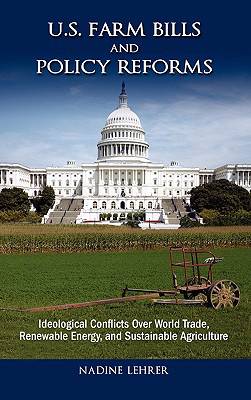
- Afhalen na 1 uur in een winkel met voorraad
- Gratis thuislevering in België vanaf € 30
- Ruim aanbod met 7 miljoen producten
- Afhalen na 1 uur in een winkel met voorraad
- Gratis thuislevering in België vanaf € 30
- Ruim aanbod met 7 miljoen producten
Zoeken
U.S. Farm Bills and Policy Reforms
Ideological Conflicts Over World Trade, Renewable Energy, and Sustainable Agriculture
Nadine Lehrer
€ 149,45
+ 298 punten
Omschrijving
U.S. farm bills are home to the nation's primary policies for agriculture, land use, and conservation. Although often outside the public spotlight, many of these policies are crucial to how land and food are managed in this country--from food stamp programs for low-income households to environmental conservation for natural resources to the often controversial commodity subsidy programs to support farmers. Examining the gains and misses for conservation in the 2008 farm bill also sheds light on agricultural sustainability prospects embedded in farm policy. In this case, the emphasis on biofuels during farm bill debates both threatened conservation with the prospect of large-scale corn ethanol production, and also shifted public focus away from reforms that might have improved agriculture's environmental and social footprint. At the same time, the 2008 farm bill did introduce some new prospects for environmentally- and socially-sustainable agricultural policies in the longer term. In examining the reasons for the 2008 farm bill's approach to and then retreat from rapid policy change, Nadine Lehrer guides us through ideological conflicts over world trade, renewable energy, and sustainable agriculture as embedded in U.S. farm policy debates. This book locates these debates within the historical context of farm bills over time, providing a concise history of agricultural policy dynamics as they relate to current issues. The book also integrates complementary theoretical perspectives from the policy change and social movement literatures, and in particular makes a case for incorporating discourse analysis into studies of policy change and policy stability. Integrating theory and history with a multidisciplinary perspective on changing situational drivers, interest group struggles, and Congressional politics, Lehrer uses the farm bill as an illustrative case for illuminating U.S. political processes and implications. This is an important work for students and scholars of the U.S. political system, especially those focused on agricultural policy, sustainability and environmental conservation, theory and methods of policy analysis, and the intersections of policy and culture.
Specificaties
Betrokkenen
- Auteur(s):
- Uitgeverij:
Inhoud
- Aantal bladzijden:
- 294
- Taal:
- Engels
- Reeks:
Eigenschappen
- Productcode (EAN):
- 9781604977011
- Verschijningsdatum:
- 18/06/2010
- Uitvoering:
- Hardcover
- Formaat:
- Genaaid
- Afmetingen:
- 152 mm x 229 mm
- Gewicht:
- 603 g

Alleen bij Standaard Boekhandel
+ 298 punten op je klantenkaart van Standaard Boekhandel
Beoordelingen
We publiceren alleen reviews die voldoen aan de voorwaarden voor reviews. Bekijk onze voorwaarden voor reviews.











